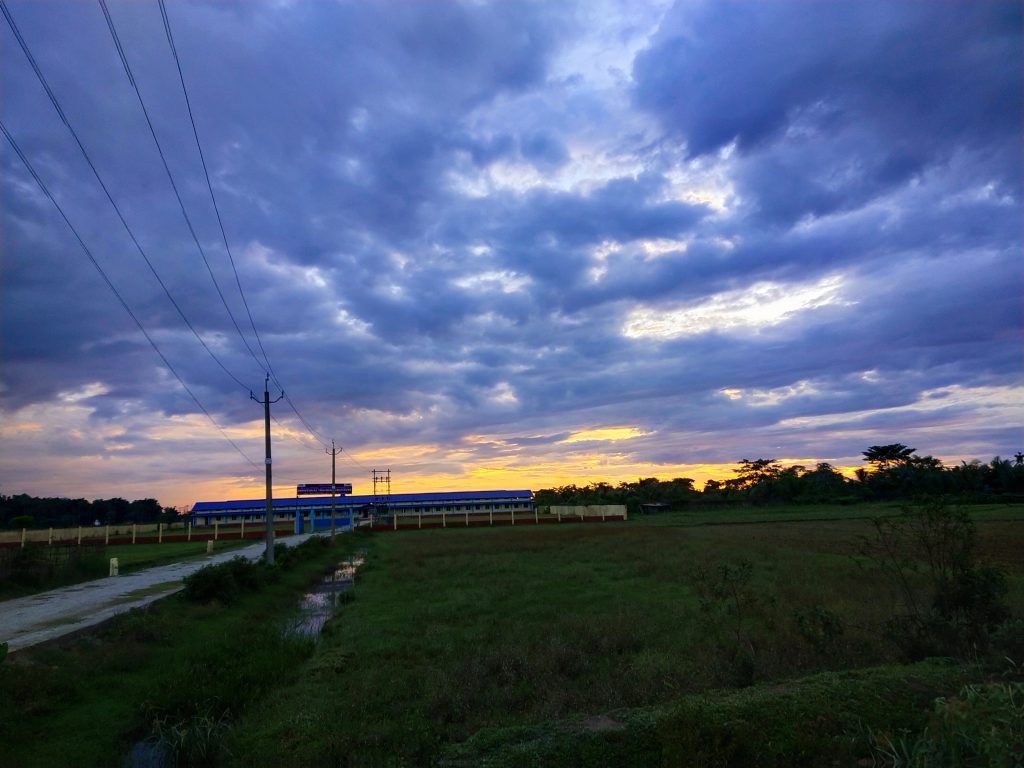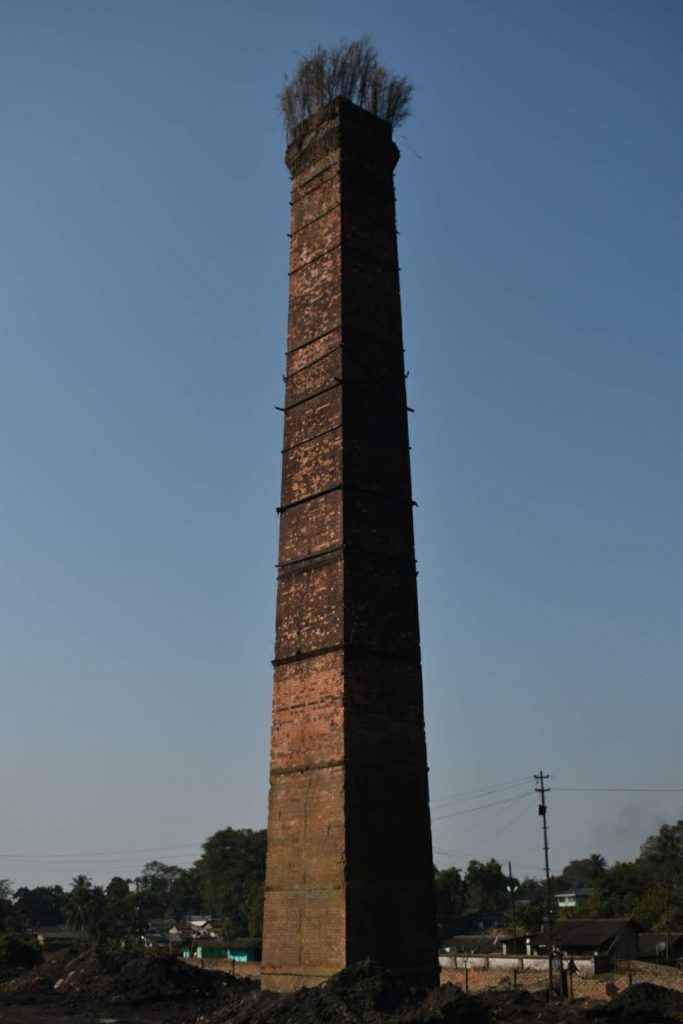
Margherita, a small town in Upper Asom, where tea-gardens roll up and down spreading lush greenery, takes one’s breath away. Hiten Bora, the then SDO had a lovely bungalow, in the midst of a tea-garden. We were there on his invitation, enjoying his hospitality, when he asked us if we were interested in going to a Singpho village. I jumped at the chance of visiting a tribal village. I have this fascination for villages, meeting different people, perhaps it’s the blood of my anthropologist father in me.
Bisagaon is a Singpho village. I had heard about tribal villages from my father, Bhuban Mohan Das. I was translating my father’s articles to be compiled into a book “The Diary of an Anthropologist” and in its process I got to know about different villages and different communities. I had also gathered some second hand knowledge about the Singphos. So, when I got the chance to visit a Singpho village, I was thrilled.
Just opposite Ledo coal mines a narrow path ran down. Our car followed that track. A big tea-garden loomed ahead. We steered along the passage through the green tea shrubs. Wherever we cast our eyes there were just green tea bushes, the looming sirish trees and the smell of the tea leaves. A never-ending field of tea bushes, as if we were lost amidst the greenery. At one point of time the car halted. A narrow river blocked our path. We got down from the car. We found some men waiting for us on the opposite bank of the river. The Singpho king was informed of our visit and so he had sent men to guide us. One of them was the Gaonburha, the village head of Bisagaon.
We crossed the river on a boat. Two men walked ahead leading us to the royal palace while Gaonburha walked behind us. We were to cover some distance on foot to the royal house. The fields were bare with only the stubbles sticking out of what were at one time green meadows. Harvest been over the crops were now stored safe in the granaries. Walking over the barren ground for some time we reached the king’s house.
A big chang-ghar, a house on bamboo stilts greeted us. A wide green field with ranges of hills all around and in front of us the big chang-ghar. The house seemed to merge in that natural surrounding. We walked up the wooden ladder. The verandah was made of dried leaves. Bare-footed we walked into a big room. The floor was of wood. Horns of a deer adorned the wall. The house seemed to speak of a past history. But modern possessions too were accommodatef. At one corner of the room was a television set.
We walked into another room. A long mattress was laid on the floor. Covering it was a Jaipuri bed sheet. We sat on it. A dwarfed table was laid before us and before each seat was a brass pot, a flat bowl and an empty glass. The pot was filled with water. We could pour water from the pot and wash our hands and faces into the big flat bowl.
The king sat opposite us. There was no mattress under him, only a rectangular piece of cloth. Above him was a rack on the wall where some English books found their place of importance.
When we asked him about his children he said he had five sons and seven daughters of which two were dead.

The king spoke about a lot of things. He was not a king now. There was no kingdom, hence no king too. But his grandfather was the king of that region called Bisagaon. They were Singpho people, their original home being Burma. To this date there were still relatives and friends in Burma. At one point of time there were no boundaries between Burma and India. They crossed hills and valleys and entered India from Burma to settle in Bisagaon. Till the days of his grandfather there were constant visits to and from Burma. But no one needed any pass to visit Burma, he said somewhat regretfully. “We may live in the plains, but we all are people of the hills. No matter how long one cuts ways to make roads, it will lead to the hills. ” The king said philosophically, “There is no other way. Hence, it’s no use showing our backs to the hills. ”
“Have you noticed one thing?” the king asked with a twinkle in his eyes. “There is no crow in this area. ”
True, this place had no crows. It was only when the king pointed out that we realised that there were no crows. He gave the reason too. “Tipam mountains are very powerful. If any crow crosses that hill then it is sure to fall sick and die. The mountain God does not allow any crow to cross the range. ”
They seemed to have a kind of fear and respect for the mountains.
“If you happen to show the rice filled bamboos towards the mountain god he gets very angry. He sends down rain and thunder in his fury. ” He meant the bamboos that were being used to steam rice.
When we discussed the problem of drugs among the present generation, and asked if his youths were falling into such troubles, the king smiled and said, “There is a story here too. There was a king. He had a daughter. She was Kani, i. e. blind. So, no youth came forth to marry her. She was very sad and cursed before dying – ‘No one was attracted towards me when I was alive, but after my death every one will fall for me. No one will be able to resist me. ’ When Kani died, she turned into a beautiful flower. Whosoever gets attracted towards her can never leave her. ”
Poppy flowers are called Kani in Assamese. We couldn’t help laughing at the way he narrated the story in reply to our curiosity regarding the youths of Bisagaon and their attraction towards drugs. It was quite a diplomatic response too.
Meanwhile, his daughters came out and put before each of us a bottle of Xaspani, i. e. home-made liquor, and a plate of pork. The king said, “This white xaspani is not at all strong. Very good for health. ” We were given some chutney to have with the pork. This cuts down the adverse effects of the pork fats.
The Singhphos eat their food before sunrise and after sunset. “There is a reason behind this, ” said one of the king’s men. He went on to explain the reason. Long time ago, when people used to live a different kind of a life, when they were more intent in gaining territories for themselves and their clan, at that time whenever they would cook and the smoke was seen from far, the enemies would get to know that there were settlers in that area and they would invade. In order that the enemies could not see from far the smoke rising out from the chang-ghar, they never cooked anything when there was light. This tradition continued to date.
It was time for our lunch. The girls put two bundles of rice wrapped in leaves on each of our plates. Then came the small bowls for each of us with chicken curry, fish curry, mashed fish, three or four types of vegetables. On opening the leafy bundles an appetizing aroma arose. However, one bundle contained so much of rice that we couldn’t even finish it. How were we to eat two bundles? When I said that one bundle would have been more than enough one of the girls said, “We are not supposed to serve just one pack. Even if you don’t eat from the other pack we have to serve two. This is our custom. ”
The girls who served us wore cloths tightly round their heads so as to cover their hair. One of the girls said, “When we cook and also when we serve we have to tie our head in this manner so that no hair falls into the food. ”
After lunch I went to see their kitchen. It was a big room with a cooking fireplace in the middle. A very big chang, i. e. a hanging platform, was over the fireplace with provisions to store things on it. A wooden staircase ran down from one side of the kitchen to a neat vegetable plot. Till the eyes could go there was a stretch of paddy field, now only with the stubbles sticking out.
When we were about to take our leave I stood below the house staring at the structure. A beautifully built large chang-ghar. At one time the king had ruled his kingdom from this very place. The king came out with his wife and said that she did everything, right from cooking to working in the paddy fields. My mind clouded as I looked at the queen. She did all her work silently. But she was the queen, even though there was no kingdom today. She was in the same position as the queen of yesteryears. Then why did she have to work so hard? When I voiced my thoughts, the king said, “I brought her with my money. I have paid for her. I have not brought her empty-handed. If I had brought her without giving anything I would be damned in hell. I have bought her and so she is mine. She has to work. ”
I thought of the dowry system in the other parts of India. There is no dowry system in Asom and the rest of the northeast, at least it was not heard of till recent times when people got to know about the system through media. Even then there are just stray cases in this region. But in the rest of India the bride’s family has to pay quite a lot to the groom’s family as dowry. When one ponders over what the Singpho king had said, then the boy actually belongs to the girl’s family, being bought with money. So, the boy should work under the girl. But things do not happen that way.
Once again we walked along the stubble field. This time the king, one of his daughters, two sons, Gaonburha and the two men who had come to fetch us from the riverside walked with us.
At a distance was a temple. The daughter pointed at it and said, “It’s a Buddhist temple. During Bihu festival, the idol of Buddha is taken out and put on a high place. The people pour water over the idol and also throw water on each other. Hence, this Bihu is known as Pani (Water) Bihu. There’s a lot of merry-making on this occasion. ”
The Singphos are Buddhist. Though they eat meat they do not kill any animal themselves. But the son informed us that at one time down history an elephant was sacrificed every year from the royal house. During the passage of time the elephant was replaced by a lamb and finally by a hen. While talking about hen, they said that the head of the hen should always be offered to the most respectable person. And for the Singphos their maternal uncle was the most highly regarded person. During feasts the heads of the chicken should be given to the maternal uncle of the family.
The king’s daughter told me that girls and boys worked equally hard in the fields as well as in the house. I asked, “Can your brothers cook?” to which the daughter said, “My brothers have to work in the kitchen in the same way as we the girls of the house do. ”
Today, we are talking about the equality of men and women, demanding that men should do the same work as the women do in the house. But the Singpho men and women have been working hand in hand in every field of life through centuries. The sons of the king were studying in English medium schools, getting their education like their counterparts in the rest of the country. Yet they had not forgotten their customs, their tradition. They talked with us in Assamese without any flaw. But among themselves they talked in their own Singpho language.
Pointing toward the distant mountain range, the king’s son said, “Through the passes of those mountains our forefathers had walked to Burma. At night they used to take shelter in the villages. The villagers offered all kinds of hospitality. They took days to reach Burma. Who can walk for such long distances today? It’s no point even if one can. You must have some kind of permit to enter. ”
It appeared that the youth of today too felt sad that the link between the mountains and the valleys had snapped. One cannot cross the political boundaries. These people still mourned their lost relationship due to the political rules.
Another interesting fact was revealed to me as I walked along with the king’s son and daughter. They did not take any food in some houses though they are on friendly terms with the family members. The reason was that their forefather had some quarrel with those families in the long past and had vowed by touching the dao (sword) that they would never take any food or water in their houses. The following generations kept that vow and the king’s family did not eat in some houses in order to stick to the pledge of their forefathers.

The history of the Singphos is not to be found in a written form. Their history had come down orally from one generation to the next. The king enlightened us with the story that their history was written on a piece of leather. But one day they were very hungry and could not find anything to eat; they made smoked leather out of the piece and ate it up. History went into their tummies. But the Singphos had to know their family tree up to the seventh generation. If they happened to visit another village they must be able to recount the names of their seven forefathers; if they couldn’t they were not allowed to enter the village or was not allowed to meet the person they were looking for. In the past when they had to travel to Burma, it was very essential that they knew the names of their forefathers up to the seventh generation. If they couldn’t, they were not permitted to stay in the village for the night. Even today the Singphos know the names of their forefathers to the seventh generation; the custom is still prevalent. It’s a nice custom; at least the people know their roots.
Once again we crossed the river by boat. I looked back at the Bisagaon we had left behind. I could never forget the people who still clung to their traditional beliefs and customs and took pride in working hand in hand, be it the royal family or the commoner of the Singpho community.![]()
Srutimala Duara a lecturer in Handique college, Guwahati is an established writer who writes in English and Assamese. She has published a number of novels, collections of short stories and articles both in English as well as in Assamese
Her acclaimed works include ‘Autumn poems’ , ‘Ashes in seas’, ‘Steet Dogs Club’ and ‘Along my routes’
